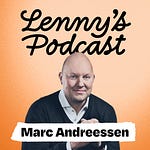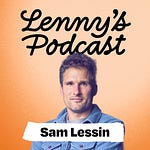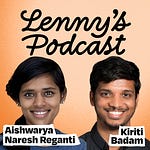Brought to you by:
WorkOS—Modern identity platform for B2B SaaS, free up to 1 million MAUs
Stripe—Helping companies of all sizes grow revenue
OneSchema—Import CSV data 10x faster
David Placek is the founder of Lexicon Branding, a company that focuses exclusively on the development of brand names for competitive advantage. Lexicon is behind iconic names such as Sonos, Microsoft’s Azure, Windsurf, Vercel, Impossible Foods, BlackBerry, Intel’s Pentium, Apple’s PowerBook, and Swiffer. Over 40 years, David’s team has named nearly 4,000 brands and companies, employing over 250 linguists and pioneering naming innovation.
What you’ll learn:
The three-step process that generated names like Windsurf and Vercel
How a name can give you the edge that no marketing budget can buy
Why you won’t “know it when you see it”
Why Microsoft called Azure “a dumb name” before it became their billion-dollar cloud platform
Why polarizing opinions are the strongest signal that you’ve found the right name
How every letter of the alphabet creates a specific psychological vibration
The diamond framework: a 4-step process any founder can use to find their perfect name
Why domain names don’t matter anymore in the age of AI
Some takeaways:
Great names make you uncomfortable. Sonos was initially rejected for “not being ‘entertainment’ enough,” Azure was called “dumb,” and the BlackBerry founders thought the name was “crazy.” The pattern is clear: if your team is comfortable with a name, you probably don’t have the right name yet.
You won’t “know it when you see it.” Despite what every founder believes, in 4,000 naming projects, Placek says clients essentially never have that instant aha moment. Why? Because humans gravitate toward comfort and familiarity, but distinctive names require embracing discomfort.
Look for names that are polarizing. When Lexicon presented “Pentium” to Intel’s executive committee, the room split between those wanting the safe “Pro Chip” and those drawn to the bold Pentium. CEO Andy Grove recognized this tension as a signal of strength, stating, “I see the polarization here . . . that tells me there’s energy for Pentium.”
Naming is not mere cosmetics—it is compounding leverage. As David explains, a distinctive word “delivers cumulative advantage” because it is spoken, typed, and searched more than any other asset, accruing mental equity every time. Simultaneously, it grants “asymmetric advantage” on launch day—before a single marketing dollar is spent—by seizing unoccupied semantic territory. Treat the name as the first growth hack in your funnel; measured over years, it becomes the cheapest ROI you will ever purchase.
Every letter has a scientifically proven psychological impact. Through proprietary research, Lexicon discovered that “v” is the most alive/vibrant sound (Corvette, Viagra, Vercel), “b” is the most reliable (BlackBerry), “z” draws attention (Azure), and “x” signals innovation. This isn’t intuition—it’s based on extensive linguistic research across cultures.
The best names often come from thinking in completely different directions. Lexicon uses three teams: one knows the real brief, one thinks they’re naming a competitor, and one works on an unrelated category (i.e. they are told they are naming a bike). Windsurf came from a team just listing “flow” concepts, not thinking about IDEs at all.
To find a great name, use the “diamond” framework: Draw a diamond and label “Win” (top), “What we have to win” (right), “What we need to win” (bottom), and “What we need to say” (left). This shifts the focus from finding words to defining behavior and experience—which is where breakthrough names emerge.
David insists you need 1,000 to 1,500 names before you’ll find gems. The process is intentionally inefficient—out of 3,000 ideas, maybe 250 are diamonds worth polishing. It’s about volume first, evaluation later.
Separate creation from judgment: Lexicon routinely begins with “two or three thousand ideas” and bans evaluation during generation. Quantity matters because legal clearance, linguistic filters, and strategy criteria will vaporize 90 % of candidates. Founders should schedule distinct phases: (1) wild, no‑filter generation across multiple metaphorical domains; (2) speculative discussion—“What could this name do for us?”—before any thumbs‑down; (3) rigorous pruning. The discipline of deferring critique protects originality from premature death.
Domain availability is no longer a deal-breaker. The .com has become “just an area code.” With AI changing how we search, SEO matters less. Get the right name first, then solve for domain (add a prefix, use .ai, or negotiate to buy it for $15K to $30K). Don’t let domain availability drive your naming decision.
Use the “competitor test” to validate bold names. Instead of asking “What do you think of this name?,” say “Our competitor just launched with this name—what’s your reaction?” This reveals what the name actually does in the marketplace rather than getting evaluative feedback about comfort levels.
Compounds (two words merged) are cognitive multipliers. PowerBook, Facebook, BlackBerry, Windsurf—these create “1 + 1 = 3” associations in the brain. Despite being longer, they’re actually more memorable and powerful than single words because they create richer mental networks and associations.
Where to find David Placek:
• LinkedIn: https://www.linkedin.com/in/david-placek-05a82/
• Website: https://www.lexiconbranding.com
In this episode, we cover:
(00:00) Introduction to David and Lexicon Branding
(04:44) The story of Sonos
(09:27) The psychology of naming
(11:33) The initial resistance to Microsoft's Azure
(14:35) The importance of a great brand name
(18:11) The three steps of naming: create, invent, implement
(28:23) Qualities of great brand name creators
(31:24) How long the naming process takes
(32:12) The Windsurf case study
(36:10) Naming in the AI era
(39:37) When to change your name
(43:10) The role of linguists
(45:54) The power of letters in branding
(48:15) The Vercel case study
(50:12) The implementation phase
(52:52) Client management and market success
(55:16) The diamond exercise
(01:04:23) Suspending judgment
(01:07:31) Polarization and boldness
(01:11:01) Domain names
(01:12:48) Final thoughts and lightning round
Referenced:
• PowerBook: https://en.wikipedia.org/wiki/PowerBook
• Pentium: https://en.wikipedia.org/wiki/Pentium
• BlackBerry: https://en.wikipedia.org/wiki/BlackBerry
• Swiffer: https://www.swiffer.com/
• Impossible Burger: https://impossiblefoods.com/
• Vercel: https://vercel.com/
• Windsurf: https://windsurf.com/
• CapCut: https://www.capcut.com/
• Azure: https://azure.microsoft.com/
• Sonos: https://www.sonos.com/
• John MacFarlane on LinkedIn: https://www.linkedin.com/in/john-macfarlane-08a8aa20/
• Harry Potter: https://en.wikipedia.org/wiki/Harry_Potter_(film_series)
• The Call of the Wild: https://en.wikipedia.org/wiki/The_Call_of_the_Wild
• Everyone’s an engineer now: Inside v0’s mission to create a hundred million builders | Guillermo Rauch (founder and CEO of Vercel, creators of v0 and Next.js): https://www.lennysnewsletter.com/p/everyones-an-engineer-now-guillermo-rauch
• Sound symbolism: https://en.wikipedia.org/wiki/Sound_symbolism
• Anduril: https://www.anduril.com/
• Anthropic: https://www.anthropic.com/
• Inside Bolt: From near-death to ~$40m ARR in 5 months—one of the fastest-growing products in history | Eric Simons (founder and CEO of StackBlitz): https://www.lennysnewsletter.com/p/inside-bolt-eric-simons
• The rise of Cursor: The $300M ARR AI tool that engineers can’t stop using | Michael Truell (co-founder and CEO): https://www.lennysnewsletter.com/p/the-rise-of-cursor-michael-truell
• Building a magical AI code editor used by over 1 million developers in four months: The untold story of Windsurf | Varun Mohan (co-founder and CEO): https://www.lennysnewsletter.com/p/the-untold-story-of-windsurf-varun-mohan
• Y Combinator: https://www.ycombinator.com/
• Chevrolet Corvette: https://en.wikipedia.org/wiki/Chevrolet_Corvette
• Viagra: https://www.viagra.com/
• In vino veritas: https://en.wikipedia.org/wiki/In_vino_veritas
• Infoseek: https://en.wikipedia.org/wiki/Infoseek
• Andy Grove: https://en.wikipedia.org/wiki/Andrew_Grove
• Churchill at War on Netflix: https://www.netflix.com/title/81609374
• Yellowstone on Prime Video: https://www.amazon.com/Yellowstone-Season-1/dp/B07D7FBB8Z
• 1883 on Prime Video: https://www.amazon.com/1883-Season-1/dp/B0B8JTS8QW
• 1923 on Paramount+: https://www.paramountplus.com/shows/1923/
• Taylor Sheridan on X: https://x.com/taylorSheridan
• Hardy fly rods: https://www.hardyfishing.com/collections/fly-rods
• T.E. Lawrence quote: https://www.goodreads.com/quotes/11340-all-men-dream-but-not-equally-those-who-dream-by
• Lawrence of Arabia: https://www.imdb.com/title/tt0056172/
• DreamWorks: https://www.dreamworks.com/
Recommended books:
• Thucydides’ Melian Dialogue: Commentary, Text, and Vocabulary: https://www.amazon.com/Thucydides-Melian-Dialogue-Commentary-Vocabulary/dp/0692772367
• Resilience: Hard-Won Wisdom for Living a Better Life: https://www.amazon.com/Resilience-Hard-Won-Wisdom-Living-Better/dp/054432398X/
• Churchill: Walking with Destiny: https://www.amazon.com/Churchill-Walking-Destiny-Andrew-Roberts/dp/1101980990
Production and marketing by https://penname.co/. For inquiries about sponsoring the podcast, email [email protected].
Lenny may be an investor in the companies discussed.














